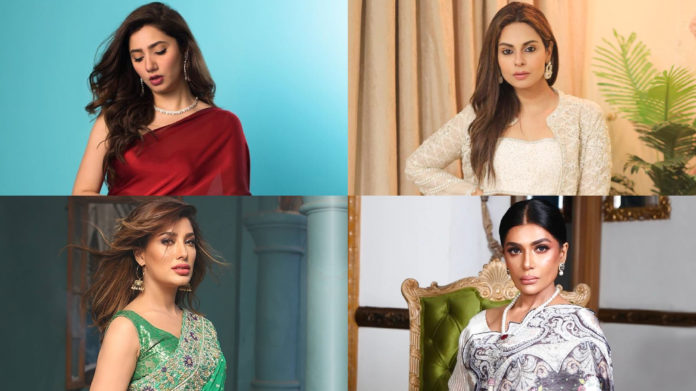Iffat Omar is not new to making controversial statements. Her outspoken personality and the convictions on her beliefs can be seen all over her social media as well as media appearances. She is also not new to being bashed for the said beliefs and statements as they tend to not sit right with the majority of the social media users.
Concerns Over Gender Pay Disparity in Pakistan’s Entertainment Industry
Recently, Iffat Omar sparked another debate with the placard she chose to display at this year’s Aurat March Lahore. Iffat has been a staunch supporter of the Aurat March movement and has attended the event in the past as well. For this year, she chose to highlight the issue of pay disparity in the industry.
The placard which read, “Kaam poora toh ujrat aadhi kyun?” (Why pay half for the work done full?) was posted on several social media platforms. On one Instagram account, a user sarcastically and crudely ‘replied’ to the placard with the comment, “Kyuke apko acting nahin ati.” (Because you don’t know how to act).
Iffat Omar chose to reply to that comment retorting that if she doesn’t know how to act, then why are there people lining up to work with her? It’s her who refuses the work. Iffat continued to highlight the issue of pay disparity in the industry in the comment and name-dropped Mahira Khan and Fawad Khan as an example to support her claim.
“Mujhe tu acting nahin ati, per Mahira ko bhi Fawad jitne paisay nahin milte.” (I may not know how to act but even Mahira [Khan] doesn’t get equal money as Fawad [Khan]).
Not a New Conversation
Now, the conversation around pay disparity in the Pakistani entertainment industry is not sudden by all means. Back in 2015 the conversation had gotten mainstream traction in Hollywood when Oscar winning actor Jennifer Lawrence wrote about her frustration at actresses being paid less than their male co-actors regardless of their contribution to the movie and the screentime.
Questions of pay disparity existing in the Pakistani entertainment industry had also been raised. Interestingly, back then some of the biggest A-lister actors had commented saying that the issue does not exist in Pakistan. Yes, Mahira Khan is also included in those A-listers.
What Do Our Male and Female Stars Have to Say?
“Actresses have always been in a position of power,” Mahira Khan had commented. She also elaborated how money is not an incentive for her when she chooses acting projects rather she takes financial matters more seriously when it comes to commercials as that’s where she chooses to set standards.
Veteran actress Atiqa Odho is known to earn a hefty sum for any project she does owing to her seniority and stature in the industry. She has been vocal about actresses’ right to demand money that reflects their stardom and contribution to the project citing her own work as an example.
Mehwish Hayat too had frankly commented that there is no pay disparity in the Pakistani entertainment industry. Responding to a question on a talk show about whether male and female actors are offered different pay for the same project, Mehwish had commented “It’s actually equal. What the male lead gets, we [female leads] get the same amount as well. I am very happy about it that there’s no pay gap here.”
Amar Khan went on-record to say that in the Pakistani drama industry, women are paid more than the men. “Unlike cinema and theater, television is a running industry; so, we get paid well. We get paid more than the man of that same drama. Women are paid more in dramas.” Amar pointed out that in Pakistan, channel owners and content heads are women so the drama industry is already “empowered” in that regard.
Hina Bayat, however, contradicted these actresses’ comments. “Women are consistently paid less and made to feel that they don’t really need the money since they are not the primary bread earners of the family.”
Humayun Saeed who has produced and starred in many commercial successes both on TV and film was of the opinion that while he would never settle for a lesser paycheck than what he thinks is his right, he is always supportive of the actresses who demand for more money for their work.
Humayun pointed out that the reason some actresses are paid less is because they don’t know their worth and they settle down for what they are being offered instead of demanding more as their worth. The women get paid accordingly to their demands.
Let’s Talk About Pay Disparity
Pay disparity is an issue that is prevalent all around the world. It stems from the root cause of countless problems – gender discrimination. Iffat Omar marching for equal pay on this year’s Aurat March whose entire manifesto is based on highlighting the problems Pakistani women face due to the rampant and deeply rooted gender discrimination within the country is not all that surprising.
However, Iffat Omar bringing up an issue that many big-name actors of the industry have gone on record to say does not exist in the Pakistani Entertainment industry does make one wonder. Was it Iffat Omar’s personal experience that made her march with the placard than what she had observed happening around her to other actresses’ part of the same industry as her.
It is a fact that the Pakistani dramas make up for the majority of the Pakistani entertainment industry and our dramas are ruled by women. Not just on-screen with heroines being the face of most of the dramas being made in the industry, but off-screen as well with producers, writers, and content heads that decide which dramas get made or not also being women. Women being paid less than men in an industry where women have such influence and power sounds a little absurd.




